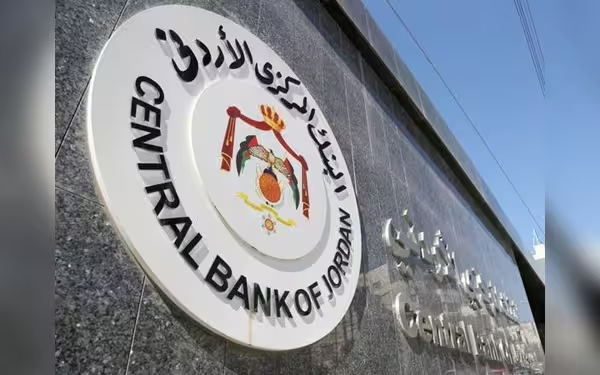Saturday, November 16, 2024 07:48 PM
CBJ Lowers Interest Rates to Enhance Economic Stability
- CBJ cuts interest rates by 25 basis points.
- Jordan's foreign exchange reserves reach $20.4 billion.
- Inflation stabilizes at 1.6 percent in 2024.
 Image Credits: menafn
Image Credits: menafnThe Central Bank of Jordan cuts interest rates by 25 basis points to support economic stability amid positive economic indicators.
The Central Bank of Jordan (CBJ) has recently made a significant decision to cut interest rates by 25 basis points, effective from November 10, 2024. This move is part of the bank's ongoing efforts to support economic stability in Jordan. The decision comes after a thorough review of local economic indicators and trends in international interest rates, reflecting the bank's commitment to maintaining an accommodative monetary policy.
The CBJ's decision to lower interest rates is not just a random act; it is a continuation of a strategy that began in September. The bank has observed several positive signs in the economy, which include strong monetary indicators and the resilience of the Jordanian dinar. Notably, the country’s foreign exchange reserves have reached an impressive $20.4 billion as of October, which is enough to cover eight months' worth of imports of goods and services.
Inflation rates have also shown signs of stability, dropping to 1.6 percent during the first three quarters of 2024. This decline is a positive indicator for consumers and businesses alike, as it suggests that prices are not rising too quickly. Additionally, bank deposits have seen a year-on-year growth of 7.1 percent, totaling JD3.1 billion by the end of September 2024. This increase in deposits reflects the public's confidence in the banking system.
Moreover, credit facilities have risen by JD1.4 billion, marking a 4.3 percent increase compared to the previous year, bringing the total to JD34.7 billion. The banking sector remains robust, with a capital adequacy ratio of 17.6 percent, one of the highest in the region, and a liquidity ratio of 138.8 percent, well above the regulatory requirement of 100 percent.
In terms of remittances, workers' contributions have grown by 3.5 percent, reaching $2.3 billion in the first eight months of 2024. Tourism income, although slightly down by 4.3 percent from the previous year due to regional instability, still stands at a commendable $5.6 billion. Furthermore, the trade deficit has narrowed by 5 percent in the first ten months of 2024, primarily due to an increase in Jordan's exports.
The economy has shown growth of 2.2 percent in the first half of the year, with an annual growth forecast of around 2.4 percent. The CBJ has reiterated its commitment to closely monitor both domestic and international economic developments to ensure monetary and financial stability in the Kingdom. This proactive approach is essential for fostering an environment that encourages sustainable economic growth.
The CBJ's decision to cut interest rates is a strategic move aimed at bolstering economic stability in Jordan. By fostering a supportive monetary environment, the bank is not only addressing current economic challenges but also paving the way for future growth. As the global economy continues to evolve, it is crucial for Jordan to remain vigilant and adaptable, ensuring that its economic policies align with both local needs and international trends.













